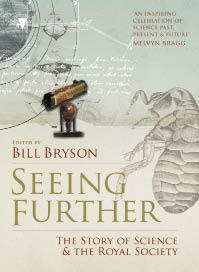In November 1660, on a damp night at Gresham College in London, a young shaver named Christopher Wren gave a lecture on astronomy. In the clearly appreciative audience were 12 ‘prominent gentlemen’, who in discussions afterwards, possibly over a drink or two, decided they would meet every week to talk about science and perform experiments. In a flash, this informal gathering coalesced into a society, which they called ‘a Colledge for the Promoting of Physico-Mathematicall Experimentall Learning’. As Bill Bryson writes in his introduction, ‘nobody had ever done anything quite like this before, or would ever do it half as well again.’
In 1662 Charles II granted them a charter, and the society became the Royal Society. This great scientific talking shop, famous for its astonishing profusion of meetings and committees, effectively invented the system of scientific publishing and peer review that has prevailed ever since.
With its far-sighted, internationalist outlook, it made English the language of science. It promoted clarity of thought, systematic experimentation and the whole notion of a scientific community, wherein knowledge was added incrementally by many hands rather than left to the handful of individual geniuses who had made all the running in the past.
Not that it excluded the geniuses. Isaac Newton was an early President, and eminent names have queued up to become Fellows ever since. Over 350 years, the Royal Society has become one of those British institutions (a little like the BBC) that we tend to take for granted, but which probably contribute as much as anything to the tiny vestiges of goodwill and respect we still manage to inspire beyond these shores.
So it’s probably unwise for the Society to put its distinguished head above the parapet and publish this substantial hardback to celebrate its 350th anniversary. (I can think of a few newspapers that would object to its blatant elitism and outmoded belief in knowledge for the sake of it.) Such is the Society’s reach that it has been able to call in an impressive and wide-ranging collection of contributors, each of them supplying an extended essay on science past, present or future.
James Gleick, author of a fine book on chaos theory some years ago, offers a splendidly wry and deadpan account of the Society’s early days, and its members’ yearning for knowledge. Margaret Atwood writes with elegance and insight on the origins of the ‘mad scientist’ stereotype. Richard Dawkins does Darwin again, but we forgive him that. The biographer Richard Holmes, who has sidestepped effortlessly into science writing, describes the heroic lunacy of early balloonists. Steve Jones writes with enviable clarity on biodiversity. Ian Stewart, the prolific populariser of mathematics, does what he does with his usual passion. Maggie Gee discusses scientists’ and writers’ fascination with the end of the world. The geologist Richard Fortey delves into the unpredictable usefulness of scientific collections, and so on.
Not all contributions are as well written as Atwood’s or Gee’s, or as accessible as Gleick’s or Jones’s, and one or two are, for this increasingly dim-witted reader at least, challengingly dense with jargon. But it’s a big book: you can safely skip those. Biodiversity fortunately extends to science writing and writers: this book gives a flavour of the many different native species.
For this, and the book’s wonderfully inclusive feel, we can surely thank Bill Bryson. Since the deserved success of his own work of popular science, A Short History of Nearly Everything, Bryson has been drawn into the bosom of the British scientific establishment, and now serves on several Royal Society committees. He was an inspired choice as editor of this book. Had a real scientist, a professional, taken on the task, the book might have been more rigorous, more esoteric, less readable. Instead, Bryson embodies the often underestimated qualities of the gifted amateur. In its benevolence and open-mindedness, not to mention its eye for the strange and unusual, the book carries his distinctive mark.
His contention is that a history of the Royal Society is a history of science itself, and the sheer range of the material gathered here demonstrates that, in a quiet, undemonstrative way.
I should add that the book is beautifully designed and produced, with numerous colour photographs that often seem to crop up just as the text is beginning to make your head throb, which might just be the idea.





Comments